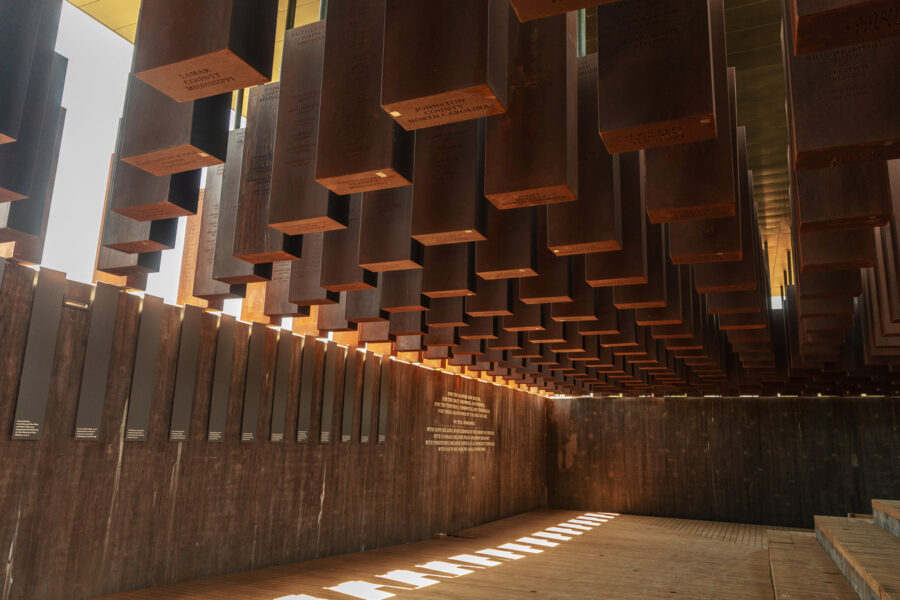Americans don’t like talking about slavery and its aftermath.
Of course, many countries and peoples have their truly dark chapters, and none of their citizens “like” talking about those things either. But as is often the case, we do things different in America. Whereas Germany criminalizes holocaust denial and has erected an ineluctable memorial in the center of Berlin for Holocaust victims, and whereas Rwanda has constructed a similar memorial space for the Tutsi lives nearly wiped out in the 1990s, there are no similar national memorials that America has constructed for the millions of lives taken in the international and domestic slave trade, or for the thousands of lynchings that occurred post-emancipation, or the Native Americans for that matter.

Memorial to the Murdered Jews in Berlin, Germany
To talk about such matters today is regarded by many Americans as out of bounds. To invoke the memory of the unlawful and systematic taking of black lives is regarded by many as drudging up unfair moments of a bygone era. To illustrate the point, when Michelle Obama’s DNC speech in 2016 alluded to the fact that the White House was a house “built by slaves,” she was widely criticized for “having disdain for her country,” for inappropriately stretching the truth (Bill O’Reilly chimes in that the slaves were “well-fed”), and for resorting to a “no-win” power play that wrongly capitalizes on a nation’s guilt.
Few will deny that American wealth was founded on the exploitation of slave labor. Most will grant that slavery was and is an evil to be condemned. But many Americans cannot understand why slavery is something to still be reckoned with today. What does this have to do with the people that we are now? This was just a moment in history where our people lost our way, but we have reckoned with all that, and we have moved on. So, please, can we just stop with the teary-eyed rehashing of ancient history? Can you stop being the Debbie of all Downers? When will it ever be enough?
Last week’s On The Media podcast on this topic (a must listen) wrestled at length with the question of the American reluctance to openly grapple with our fraught history (particularly with respect to black lives). The end of the podcast concluded with the reflections of a young German news editor, who while growing up in a generation far removed from the Nazi regime and even the Berlin wall, sees the enduring importance of his generation and future generations to continue to deal with the worst of their history and to not forget. His thoughts were striking and worth quoting here:
“There is no such thing as moving on. The controversial thing about dealing with history is that once you start, you’re never going to be done with it. There’s no such thing as dealing with it and then finally having dealt with it. And that’s what makes people so afraid to start dealing with history at all. There’s no point at which we can say, ‘we are done now.’ This is always going to be what happened.”
To attempt to reckon with the past is to open up something for the long haul — holding up our worst mistakes both for ourselves and our posterity. Few will want to sign up for this willingly. As a son of Korean parents, whose countrymen are still within living memory of the Japanese occupation, I have followed the story over the years of Prime Minister Abe’s ambivalent, remorseful, yet carefully worded, non-apologies toward the “comfort women” of Korea. As early as this year, Abe expressed ire at the promptings from Korean officials to re-visit the issue of comfort women; a matter he believed was resolved “finally and irreversibly” in a 2015 statement. While Abe and much of the Japanese people want to move on, Korean social memory has difficulty doing so when Japanese sentiments on the matter continue to be colored with ambivalence and even outright denial of the past. These things never truly resolve “finally and irreversibly.” Future generations are bound to confront the issues afresh.
For America, our very constitution has enshrined slavery in its founding texts (Article I, Section 9, Clause 1; Article IV, Section 2, Clause 3; and Article V). This was the starting point of our country. This is not only a momentary, black-eye on our history; it forms the very structure of who we are as a people. To say that this has nothing to do with who we are now is to deny something fundamental to American identity. Worse yet, to suggest somehow that the legacy of slavery is something isolated in the past evinces serious blindspots to the reality of black people in the United States. From Jim Crow segregation, to domestic terrorism in the form of lynchings, race riots, and pogroms, to more subtle forms of oppression, the legacy of slavery and its aftermath continue to manifest in the mass incarceration of black people, police violence, disparate impact in school expulsions for black students, the list goes drearily on. It shocks me to this day that few Americans know the story of the Tulsa Race Riots of 1921.
So what are we to do? We as a people like closure. We prefer moving on. We seek healing. But sometimes, these options are simply not on offer for us in the way we hope. It may be wisest to let go of the idea of “moving on” altogether. This will always be what happened. This will always be at the genesis of what America is and what it is still becoming. What is necessary is to listen to the stories, the protests, and the cries of oppressed and hurting communities. The real problem at present is that not only are we as a people not willing to grapple with the details of our past, but those that try to encourage an airing of these issues are rebuked for doing so. The conversation is not only ignored; it is prohibited from even taking place.
In my humble estimation, what needs to happen at a minimum is an openness to confront the issues directly (if not to the degree that the Germans and the Rwandans have modeled, at least something approaching a visible reckoning with slavery and its legacy today). Sadly, it is seen as un-American to call attention to moments that indicate the deep flaws of our country’s origin and development. But this must certainly change. What is sorely needed are memorials, touchstones, forums, and visible reminders that enable each new generation to re-confront the issue and to engage with the past in a fresh way. Not so that we can move on, but rather so that we can see things as they are. Some things just will not lie dormant in the past.





Leave a Reply
Your email is safe with us.